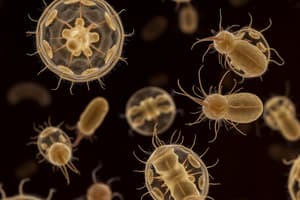Podcast
Questions and Answers
What are common symptoms of malaria?
What are common symptoms of malaria?
- Nausea and runny nose
- Fever and muscle pain (correct)
- Joint pain and skin rash
- Chest pain and dizziness
How is malaria primarily transmitted to humans?
How is malaria primarily transmitted to humans?
- Through contaminated food and water
- Via infected female Anopheles mosquitoes (correct)
- Through the air by respiratory droplets
- By physical contact with an infected person
What is used for confirming a diagnosis of malaria?
What is used for confirming a diagnosis of malaria?
- Physical examination only
- Urine analysis
- Rapid diagnostic tests (RDTs) (correct)
- Blood pressure measurement
Which parasite is primarily responsible for causing malaria?
Which parasite is primarily responsible for causing malaria?
What is the recommended first-line treatment for uncomplicated malaria?
What is the recommended first-line treatment for uncomplicated malaria?
Can humans transmit malaria to others directly?
Can humans transmit malaria to others directly?
Flashcards are hidden until you start studying
Study Notes
Symptoms
Symptoms of malaria commonly include fever, chills, sweats, fatigue, muscle pain, headache, vomiting, diarrhea, abdominal pain, and jaundice. Some individuals may experience additional symptoms like cough, sore throat, shortness of breath, chest pains, seizures, loss of consciousness, coma, or shock. Persistent non-specific symptoms or atypical presentations may complicate the diagnosis.
Causes
Malaria is caused by protozoan parasites known as Plasmodium, primarily P. falciparum and P. vivax. These parasites are transmitted to humans via infected female Anopheles mosquitoes during blood feeding. Humans cannot directly transmit the disease to others without going through the mosquito intermediate host.
Diagnosis
Diagnosing malaria typically involves a combination of clinical examination, laboratory tests, and sometimes imaging techniques. Rapid diagnostic tests (RDTs) are often used, which detect specific proteins produced by the parasite in the patient's blood. Microscopic analysis of thick and thin blood films, polymerase chain reaction (PCR), and complete blood count are also utilized for confirmation.
Treatment
Appropriate treatments include anti-malarial drugs chosen based on the type of Plasmodium causing the illness and the individual's response to previous therapies. Artemisinin-based combination therapies (ACTs) or alternative regimens like quinine and clindamycin are recommended as first-line treatments for uncomplicated malaria. Severe malaria requires intensive care support, such as intravenous fluids, blood transfusions, respiratory assistance, and organ failure management. Malnutrition, physical exhaustion, and underlying diseases may exacerbate the severity of the condition.
Prevention
Preventive measures involve reducing contact with infected mosquitoes and controlling mosquito populations. Personal protective actions include wearing insect repellent, sleeping under treated bed nets, and applying residual insecticide to walls inside homes. Chemoprevention with primaquine for P. vivax and P. ovale infections, mass drug administration in high-risk communities, and the targeting of vector habitats with larval space controls can play roles in broader prevention strategies.
Studying That Suits You
Use AI to generate personalized quizzes and flashcards to suit your learning preferences.




